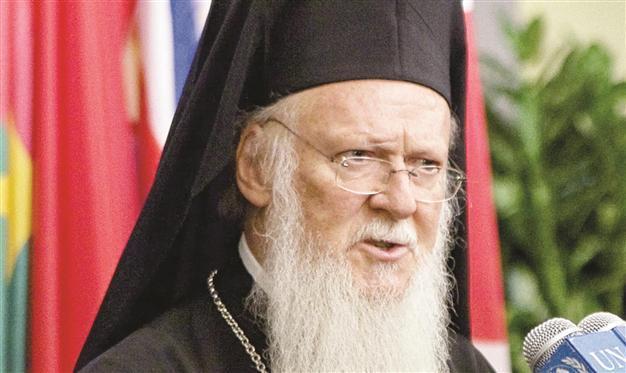Turkish public unaware of truth of Imbros: Patriarch
ISTANBUL - Hürriyet Daily News

Turkish society is not informed about the cruelty that occurred on the island at the time because of limited opportunities for communication, Greek Orthodox Patriarch Bartholomew says. AA photo
The Turkish public must acknowledge the injustices Greeks on Imbros island (Gökçeada) suffered in the 1960s, Greek Orthodox Patriarch Bartholomew said Nov. 12 at the launching of a book on the island’s Greek community.
“Imbros could be a bridge between Turkey and Greece, but it was comprehended as a threat by Turkey. With this approach, the Rum [Anatolian Greek] minority, who were engaged in agriculture and raising livestock on the island, were forced to emigrate from there,” the patriarch said.
Turkish society is not informed about the cruelty that occurred on the island at the time because of limited opportunities for communication, he said.
Jail built on islandAccording to Feryal Tansuğ, a historian at Istanbul’s Bahçeşehir University, who compiled the book “İmroz Rumları, Gökçeada Üzerine” (Rums of Imbros, on Gökçeada), non-Muslims on the island were targeted as part of an official policy that included allowing inmates at a jail built on the island to roam free and harass locals.
“In 1960, there were nearly 6,000 Rums on the island, and the number is only 300 now,” Tansuğ told the Hürriyet Daily News yesterday.
The book represents the first comprehensive academic study written in Turkish on the island’s Greek minority issue.
Imbros, which was officially renamed Gökçeada in 1970 by Turkey, is located in the north Aegean Sea at the entrance of Saros Bay and is also a district of Çanakkale. A large majority of the island’s Greek population has left the island for various reasons since the beginning of the 1960s.
“There is a lack academic study on such an important matter. When we talk about Rums of Turkey only Istanbul, Cappadocia and Pontic Rums are remembered, but Imbros is forgotten and it is a case that cannot be ignored,” Tansuğ said.
Pro-Hellenic nameTansuğ said she titled the book “Imbros,” a pro-Hellenic name, because the appellation is 5,000 years old and is still used by locals, unlike “Gökçeada,” which was given by the Turkish government in 1970.
The patriarch also expressed hope for the future. “Even if it has a different demography now, we will do our best for Imbros to [make it] an island where people live happily,” he said. k HDN
